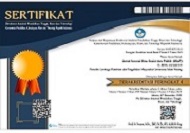The ideological interests of the State and Nahdlatul Ulama in the dissolution of Hizbut Tahrir Indonesia
DOI:
https://doi.org/10.33474/jisop.v4i1.15896Keywords:
Political Interest, Ideology, HTI, NUAbstract
This article discussed the contestation of ideological interests between the state, Hizbut Tahrir Indonesia (HTI), and Nahdlatul Ulama (NU) in the case of the disbandment of HTI in 2017. The disbandment of HTI explained the existence of pro and contra groups and the attraction of ideological interests. This research was qualitative research with observation and interview methods. The research results proved that there were conflicting and conflicting interests between the interests of the state, HTI, and NU. The state interests were the interests of the Pancasila ideology and public security. NU rejected the caliphate because it was interested in defending the "Islam Nusantara" ideology. NU's success in encouraging the government was influenced by the issues' relevance and the condition of the political structure of Joko Widodo's government for the 2014-2019 period. The polarized condition of the government's political structure in the Jokowi versus Prabowo group influenced the decision to disband HTI because NU was identified with moderate Islam that supported Jokowi. Hence, NU's bargaining power with the Jokowi government was more substantial than HTI.References
Abdillah, M. (2013). Hubungan agama dan negara dalam konteks modernisasi politik di era reformasi. Ahkam: Jurnal Ilmu Syariah, 13(2), 247–258. https://doi.org/10.15408/ajis.v13i2.937
Almond, G. A., & Powell, G. B. (1988). Comparative Politics Today: A World View (S. Foresman & A. Wesley (eds.); 4th ed.). Brown College Division.
Anwar, E. (2009). The Dialectics of Islamophobia and Radicalism in Indonesia. Asianetwork Exchange: A Journal for Asian Studies in the Liberal Arts, 16(2), 53–67. https://doi.org/10.16995/ane.223
Azzaro, M. N., & Dewi, P. A. R. (2018). Analisis Framing Pemberitaan Kasus Pembubaran Hizbut Tahrir Indonesia (HTI) Di Kompas. com, Tempo. co, dan Republika. co. id. Commercium, 1(1), 18–21. https://jurnalmahasiswa.unesa.ac.id/index.php/Commercium/article/view/25445/23326
Bungin, B. (2001). Metodologi penelitian sosial: format-format kuantitatif dan kualitatif. Airlangga University Press.
Burhan, F. (2017). Analisis Wacana Terhadap Teks Berita Pembubaran HTI Pada Media Online Faika Burhan Liputan6.Com Terbitan Mei-Juli Tahun 2017. Jurnal Jurnalisa, 3(1), 121–135. https://doi.org/10.24252/jurnalisa.v3i1.3091
Burhanuddin, N. (2016). Akar dan Motif Fundamentalisme Islam: Reformulasi Tipologi Fundamentalisme dan Prospeknya di Indonesia. Wawasan: Jurnal Ilmiah Agama Dan Sosial Budaya, 1(2), 199–210. https://doi.org/10.15575/jw.v1i2.831
Bush, R. (2009). Nahdlatul Ulama and the Struggle for Power Within Islam and Politics in Indonesia. Institute of Southeast Asian Studies.
Fathoni. (2017). PBNU: Perppu Ormas Langkah Cerdas dan Konstitusional. NUOnline. https://nu.or.id/nasional/pbnu-perppu-ormas-langkah-cerdas-dan-konstitusional-2Tdal
Fealy, G., & Barton, G. (1996). Nahdlatul Ulama, Traditional Islam and Modernity in Indonesia (1st ed.). Monash Asia Institute.
Fernandes, A. (2018). Politik Identitas dalam Pemilu 2019: Proyeksi dan Efektivitas. https://www.csis.or.id/publications/politik-identitas-dalam-pemilu-2019-proyeksi-dan-efektivitas/
Mahdi, I. (2017). Pembubaran Ormas “Radikal†dalam Persepektif (Kajian Khusus Perppu No. 02 Tahun 2017). Nuansa : Jurnal Studi Islam Dan Kemasyarakatan, 10(2), 132–144. https://doi.org/10.29300/nuansa.v10i2.648
Martin, A. (2003). Gerakan politik nahdlatul ulama di era reformasi pengaruhnya terhadap ketahanan nasional. Universitas Indonesia.
Muazaroh, S. (2019). The Dissolution of Hizbut Tahrir Indonesian (HTI) of Maqashid Perspective: Authorities or Authorithanism. Justicia Islamica Jurnal Kajian Hukum Dan Sosial, 16(1), 103–120. https://doi.org/10.21154/justicia.v16i1.1622
Mubarak, M. Z. (2008). Genealogi Islam radikal di Indonesia: gerakan, pemikiran dan prospek demokrasi. Pustaka LP3ES Indonesia.
Njoto-Feillard, G. (2015). Ripples from the Middle East: The Ideological Battle for the Identity of Islam in Indonesia. ISEAS Yusof Ishak Institute.
Orofino, E. (2019). The Appeal of Vocal Islamism in the West The Case of Hizb ut Tahrir vis-à -vis Its Competitors. International Journal of Humanities and Social Sciences, 13(7), 1009–1019.
Prasetyo, B. (2019). Pembubaran Hizbut Tahrir di Indonesia dalam Perspektif Sosial Politik. Analisis : Jurnal Studi Keislaman, 19(2), 251–264. https://doi.org/10.24042/ ajsk.v19i2.3371
Qohar, A., & Hakiki, K. M. (2017). Eksistensi Gerakan Ideologi Transnasional HTI Sebelum dan Sesudah Pembubaran. Kalam, 11(2), 365–396. https://doi.org/10.24042/klm.v11i2.1403
Satori, D., & Komariah, A. (2010). Metodologi penelitian kualitatif (2nd ed.). Alfabeta.
Downloads
Published
How to Cite
Issue
Section
License
.


_-_Copy.jpg)





